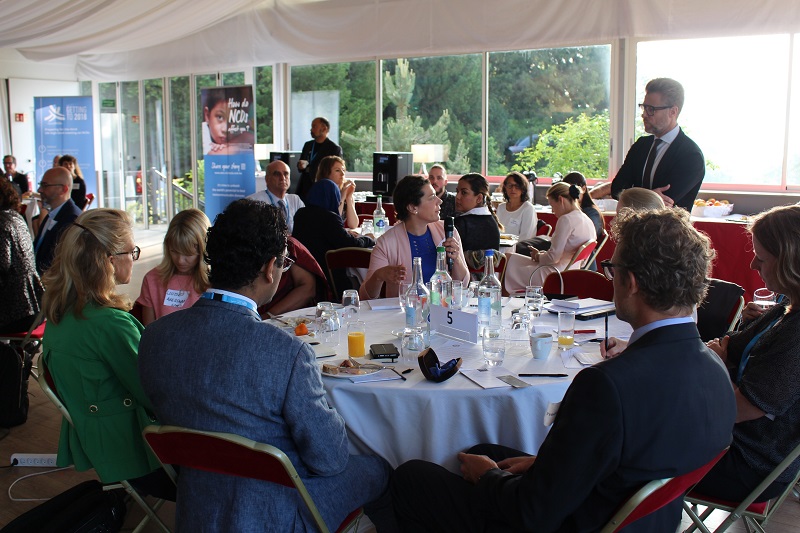As part of the World Health Organization’s 71st World Health Assembly (WHA71), the Global Coordination Mechanism on noncommunicable diseases (GCM/NCD) held its third annual breakfast for GCM/NCD Participants.

Located at Domaine de Penthes, Geneva, the informal morning event brought together 80 GCM/NCD Participants to consider two critical milestones for the GCM/NCD. The first was the Preliminary Evaluation of the GCM/NCD, which was presented for consideration by Member States at the WHA71. The second was the preparation for the General Meeting of the GCM/NCD, which will take place in November 2018 and will be hosted by a WHO Member State.
GCM/NCD Participants provided valuable reflections and insights on the purpose and use of the GCM/NCD, currently and in the future. This involved pinpointing and describing potential barriers and enablers for the GCM/NCD in supporting the implementation of SDG target 3.4 and other NCD-related targets and commitments.
The topic of the evaluation was introduced by the GCM/NCD’s head of secretariat, Dr Bente Mikkelsen with Dr Elil Renganathan from the WHO Evaluation Office providing a comprehensive overview of the evaluation. Assistant Director General for NCDs and Mental Health, Dr Svetlana Axlerod provided reflections on the evaluation and described the importance for GCM/NCD to enter the second phase of its strategy. This was followed by country reflections from Mr Philippe Damie of France on the soon to be launched Francophone Community of Practice and Dr Mohsen Asadi-Lari on developing appropriate processes for effective coordination, communication and dissemination of information in the Islamic Republic of Iran.
Attendees were then given the opportunity to provide reflections and potential solutions, through facilitated group exercises. Each table was divided with a range of relevant backgrounds, and presented with topics from the preliminary evaluation covering strengthened coordination between the GCM/NCD and UN organizations, opportunities and processes to further facilitate the engagement of Member States, developing a monitoring framework to enable regular tracking and reporting of progress among others.
The discussions were facilitated by leaders in each focus area, including representatives from the United States of America, Permanent mission of Ecuador, United Nations Interagency Task Force on NCDs, United Nations Development Programme, University of Oxford, Global Alliance for Chronic Diseases, International Federation of Pharmaceutical Manufacturers and Associations (IFPMA), World Economic Forum, International Food and Beverage Alliance and Young Professionals Chronic Disease Network. Groups fed back a selection of their key points from their groups to the rest of the attendees during the breakfast and a full written summary will be posted on this webpage in due course.
The second section of the Breakfast focused on successful engagements of the GCM/NCD. Here examples and reflections were provided on GCM/NCD activities including from Mr Thomas Cueni (IFPMA) on the GCM/NCD’s unique position in engaging with the private sector, Ms Cristina González on the WHO Global Conference on NCDs supporting Uruguay’s efforts to advance their national NCD agenda, and Mr Jakob Madsen of the World Diabetes Foundation on their support of the recent Global Dialogue on Partnerships for Sustainable Financing of noncommunicable Disease. The breakfast ended with a screening of a new animation linking urban settings and NCDs created by NCDFREE and Saxion University – a partnership facilitated by the GCM/NCD.
The GCM/NCD Secretariat thanks Participants for attending, and will seek further inputs on their views of the preliminary evaluation of the GCM/NCD through a Community of Practice for GCM/NCD Participants.
